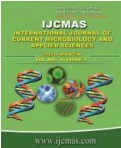


 National Academy of Agricultural Sciences (NAAS)
National Academy of Agricultural Sciences (NAAS)

|
PRINT ISSN : 2319-7692
Online ISSN : 2319-7706 Issues : 12 per year Publisher : Excellent Publishers Email : editorijcmas@gmail.com / submit@ijcmas.com Editor-in-chief: Dr.M.Prakash Index Copernicus ICV 2018: 95.39 NAAS RATING 2020: 5.38 |
Soil organic matter content and several fractions of soil organic carbon are considered to be sensitive indicator of soil health who on several conditions like cropping choice and management practices. The presence of different soil organic C pool in rice cultivating soils are well documented but thoroughly studied information on relation between soil C status and different rice based cropping managements are not available. Total organic C, water extractable organic C, humus C, microbial biomass C and total carbohydrate analyzed on the soils of long term cultivated rice fields for this study. Three rice based cropping systems like rice-rice, rice-wheat, and rice-fallow from semi-arid climatic zone of west Bengal were chosen for this purpose. After long term cultivation it was found, soils may face 50-60% depletion of TOC in cultivated soils than uncultivated virgin grasslands. WEOC, MBC were considered as most sensitive parameter because of their significant correlation with other parameters and capability of concluding on overall soil health. Both the parameters showed rice-wheat (53% and 27% higher than rice fallow respectively) soil is much more biologically active than others. Total carbohydrate was found higher in rice-rice (80% higher than rice fallow) and humus was found higher rice-fallow (76% higher than rice rice) soils, reflecting differential impact on various C pools by different management practice of rice. The correlation found between SOC pools were mostly positive but with varying magnitude. Soil C pool dynamics after long term cultivation affect not only justifies variable physicochemical and biochemical soil properties but also gives a clue for choosing a suitable cropping pattern which may returns with better soil health.
 |
 |
 |
 |
 |